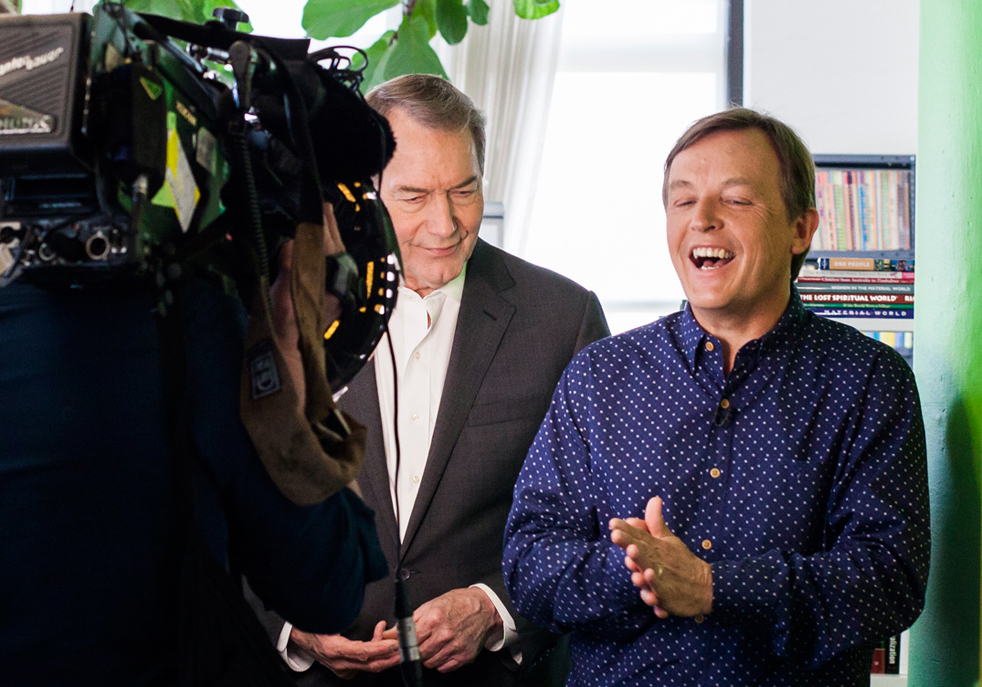
Charlie Rose of 60 Minutes interviews TED Curator Chris Anderson in TED’s New York office. Photo: Dian Lofton/TED
On tonight’s episode of 60 Minutes, a segment called “TED Talks” tells the story of three TED speakers whose talks rippled out into the world, transforming their own lives as well as the lives of many people who watched. Amy Cuddy shared a deeply personal story that sparked her research into “power posing”; Bryan Stevenson used his talk to raise awareness about legal injustice; and Maysoon Zayid hopes her talk helped give disabled people a new voice.
This 60 Minutes segment was more than a year in the making. Producer Henry Schuster tells the TED Blog that the idea for the story snuck up on him and co-producer Rachael Kun Morehouse.
“If we’re thinking about doing a story on somebody, we talk to them and we try to look at video of them to see if [they] have passion. TED Talks are a great thing to look at. … It was a tool for us,” says Schuster. “I’m not sure exactly when, but the two of us looked at each other and had that proverbial a-ha moment: ‘We should be doing a story about TED.’”
After watching a ton of talks, interviewing members of the TED staff and doing additional research, Schuster and Morehouse first thought the story would focus on the recent growth of the organization itself — on how it was expanding into education with TED-Ed, rolling out independently organized events across the world through TEDx, or bringing talks into more than 100 languages through the Open Translation Project. But the two eventually found a different focus: what happens after a talk goes viral online.
“One of the questions that we were asking way back when was, ‘Tell us about the impact of TED Talks.’ That was a hard thing for us to understand,” says Schuster. “One of the people we went to as we were struggling with this question was Mark Bezos.” Bezos, a senior vice president at the Robin Hood Foundation, gave the TED Talk, “A life lesson from a volunteer firefighter,” in 2011. “He said: Look, if you talk about the responses I got on an individual level from giving my TED Talk, you can’t necessarily say, ‘Oh look that school got built because of the talk,’” recalls Schuster. “He helped us widen our focus … It might be individuals reaching out to a person who gave a TED talk, or somebody doing something as a result of a talk. It’s not necessarily a linear path.”
.
Schuster and Morehouse — along with Charlie Rose — started thinking about the long-tail impact of talks, about how they spark viewers to action in the momnet but can also subtly reshift the way they think in ways that might not be obvious for 10, 20, 30 years.
“We ended up doing it the TED way, which is the personal stories and the big idea,” says Schuster, of landing on the approach to focus on three speakers. “The big idea out of all of this is: putting the TED Talks online. Because otherwise, TED would still be … this great, cool, quirky conference. But it’s not. It’s an internet phenomenon.”
Schuster and Morehouse say that they had to leave many of their favorite interviews and moments on the cutting room floor in creating the segment. Morehouse had adored an interview conducted with TED’s founder, Richard Saul Wurman, about the start of the organization. And Schuster loved an interview with Anwar Dafa-Alla, the organizer of TEDxKhartoum, whose event was shut down by Sudanese security in 2013. “Each of those could be a documentary in itself,” says Morehouse.
But in the end, those interviews didn’t quite serve the story.
“People think that we come into a story and have it all figured out,” says Schuster. “But this is a story that kept changing all the way through. The fun part of our job is to get to spend the time and try to understand, and then figure out the best way of telling it. … I don’t think we quite fully understood that until these last three weeks as the piece was coming together in its current form.”
Head over to 60 Minutes’ website for more clips from the show. And watch the TED Talks from Amy Cuddy, Bryan Stevenson and Maysoon Zayid in their entirety below.
[ted id=1569]
[ted id=1378]
[ted id=1898]
Comments (4)